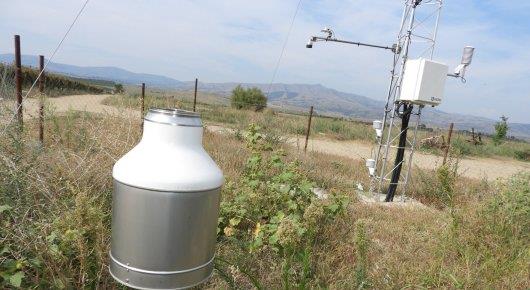Timely, advance weather data can benefit Macedonian farmers

With extreme weather events posing serious risks to agriculture and the rural economy, the Macedonian Government has recognized the importance of regular information and early warning systems in guarding agriculture against climate change.
At a workshop today in Gradsko, FAO and the Macedonian National Hydrometeorological Service have brought together participants from numerous areas – including the Ministry of Agriculture, Forestry and Water Economy; the National Extension Agency; academia; farmers’ organizations; and civil society – to present achievements and identify future needs for strengthening the agrometeorological sector.
In a project aimed at reducing the vulnerability of Macedonian agriculture to climate change, implemented between 2016 and 2018, FAO supported the National Hydrometeorological Service in producing and disseminating climate data and agrometeorological information important for agricultural production.
Three automated weather stations were installed in Gradsko, Kochani and Strumica – regions characterized by intensive production of grapes, rice and vegetables. The new weather stations will help the country gather important climate data from each region and produce updated agrometeorological information to inform the farming practices of local producers and help them mitigate the impact of climate change.
In addition to an increased network for data collection, the project also supported the digitalization of weather data from the past 20 years to better analyze climatic trends. All data is available on the newly established agrometeo.mk website, hosted by the National Hydrometeorological Service. The site offers historic climate data, agro-meteorological alerts as well as phenological monitoring and forecasting to help farmers cope with major climate-induced pest diseases. In the pilot regions, timely and accurate information will help farmers implement adequate agrotechnical measures while preserving the environment.
FAO also partnered with civil society to address the country’s lack of climate change education. Starting with the 2018-19 school year, climate change has been officially introduced in the curricula of Macedonian agricultural secondary schools.
To help farmers with climate change adaptation, National Extension Agency advisers were also trained on agro-meteorology, pest and animal disease control (namely Bluetongue disease and Lumpy skin disease) and adaptive measures for livestock, especially for dealing with heat stress.
In today’s workshop, concluded by a field visit to the Gradsko weather station and the local Stobi vineyards, participants discussed opportunities to further update agro-meteorological information tailored to the needs of end users and expand its reach and accessibility to local farmers.
26 September 2018, Skopje, The former Yugoslav Republic of Macedonia
